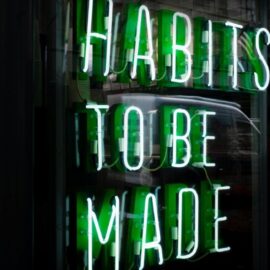

This article is an excerpt from the Shortform book guide to "Happy Sexy Millionaire" by Steven Bartlett. Shortform has the world's best summaries and analyses of books you should be reading.
Like this article? Sign up for a free trial here.
Why and how should you stop labeling yourself? How can self-labeling be damaging?
Steven Bartlett founded the successful internet company Social Chain at age 21 and was by all objective accounts “living the dream.” But when wealth and fame didn’t bring him happiness, he wrote Happy Sexy Millionaire to warn against chasing false idols.
Read on to learn how to stop labeling yourself and live a label-free lifestyle, according to Bartlett.
Why Labels Are Harmful
In his book Happy Sexy Millionaire, Steven Bartlett argues that it’s important to learn how to stop labeling yourself because when you allow labels to define you, you’re held back from being your true self and achieving your goals. This prevents you from feeling contentment in your life. He says that science shows that the longer you accept a negative label as something that defines you, the more likely you are to behave in ways that prove your self-categorization to be accurate—in other words, it becomes a self-fulfilling prophecy.
Bartlett asserts that you should reject labels and stop labeling yourself, good and bad, and focus on the fact that you are, first and foremost, a human being. You are not your job, your accomplishments, or your future dreams. This starts with pushing yourself out of your comfort zone and proving to yourself that you are more than any simplistic label.
Principle illustrated: When Bartlett was 18, he met a 26-year-old man at a hip-hop club who was short, unsure of himself, and poorly dressed. The man repeatedly asked Bartlett for work. Despite his appearance and demeanor, and unaware that the man lived with his mother and spent most days playing video games, Bartlett took a chance and hired him as his marketing director.
In the six years that followed, this man played an integral role in helping Bartlett build one of the most powerful social media companies in the industry, then he went on to run his own successful business. Bartlett says that the man’s repeated outreach to him after they first met—his persistence in seeking a job from Bartlett—reflected his refusal to be defined or held back by the kind of label that many might assign to someone living in his circumstances (slovenly, lazy, and so on).
(Shortform note: History offers an example that validates Bartlett’s advice to stop labeling yourself: The Myers-Briggs personality test, one of the most popular personality classification tools, is neither rooted in nor validated by science. The mother-daughter team that created the test had no training in psychology, psychiatry, or testing and no experience in labs or academic institutions. They developed the test at home because women in the 1900s lacked access to universities. Psychologists say it’s problematic to rely so heavily on a classification tool that lacks scientific foundation. This is because when people are given a personality label that’s accepted as general truth, they believe it’s true even when their behavior doesn’t fit it.)
Tips to Stop Labeling
To learn how to stop labeling yourself, Bartlett states you can begin by recognizing that you’re the product of your environment and circumstances, and that those things may have shaped you, but they are not you. You can support this recognition by gathering evidence that proves you’re different from—and more than—those experiences. Gather this evidence by taking on challenges that a) push you out of your comfort zone and b) force you to redefine who you think you are and what you’re capable of.
Bartlett acknowledges that taking on new challenges can be difficult because nobody likes uncertainty or feeling uncomfortable, but he argues that you must align your intention with action to grow and reach your goals.
He asserts that successful people directly confront the uncertainty that comes with taking on new challenges. They do this by calculating the risk of potential bad outcomes and accepting that no outcome will be perfect, and not allowing their emotions to sideline them. There’s no perfect decision or choice, so overthinking and procrastinating when you’re dealing with uncertainty is unhelpful and results in missed opportunities. Directly facing uncertainty (the space between your known, unhappy situation and your unknown, potentially happy one) opens the doors to opportunities for greater contentment.
Bartlett argues that if deep-seated issues prevent you from taking concrete steps to pursue your dreams, you should go to therapy to illuminate and address the roots of thinking and behavior that are getting in your way.
| Navigate Challenges and Uncertainty In Girl, Stop Apologizing, Rachel Hollis offers a different way to stop labeling yourself by tackling fear and self-limiting beliefs that can hold you back: Recognize that everyone struggles when they start new, difficult things. She says that when you take on a new challenge, you should be willing to be bad at it for a long time rather than worrying about being innately good at it from the get-go, because expecting instant success will sabotage your progress. If you find it difficult to give yourself permission to be bad at new things, try these two strategies for confronting your demons and getting support to vanquish them: 1. Let yourself be “good enough” instead of perfect. To do this, identify and acknowledge the specific fear that’s triggering you. For example, “I’m worried that people will think I’m stupid,” or, “I’m afraid that I won’t be able to perform in the moment.” Experts say the assumption underlying these fears is often that if they actually play out you won’t be able to recover, but you only need to talk to people who have survived and learned from their failures to counter that assumption. 2. Reach out and connect with someone. Part of the challenge of doing something new is feeling like you’re all alone. Reaching out to others and asking them for guidance and insight can make you feel less isolated and help you think through different ways to approach your situation that you hadn’t considered. |

———End of Preview———
Like what you just read? Read the rest of the world's best book summary and analysis of Steven Bartlett's "Happy Sexy Millionaire" at Shortform.
Here's what you'll find in our full Happy Sexy Millionaire summary:
- Why wealth and fame won't always bring you happiness
- Why you shouldn't follow steps and hacks to find happiness
- The best practices for pursuing happiness and success






